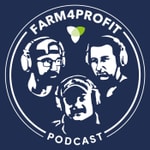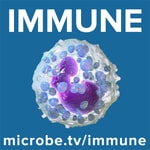Talking Biotech with Dr. Kevin Folta – Détails, épisodes et analyse
Détails du podcast
Informations techniques et générales issues du flux RSS du podcast.

Talking Biotech with Dr. Kevin Folta
Colabra
Fréquence : 1 épisode/8j. Total Éps: 463

Classements récents
Dernières positions dans les classements Apple Podcasts et Spotify.
Apple Podcasts
🇨🇦 Canada - lifeSciences
29/07/2025#93🇺🇸 États-Unis - lifeSciences
29/07/2025#46🇨🇦 Canada - lifeSciences
28/07/2025#58🇩🇪 Allemagne - lifeSciences
28/07/2025#90🇺🇸 États-Unis - lifeSciences
28/07/2025#49🇨🇦 Canada - lifeSciences
27/07/2025#83🇩🇪 Allemagne - lifeSciences
27/07/2025#80🇺🇸 États-Unis - lifeSciences
27/07/2025#62🇺🇸 États-Unis - lifeSciences
25/07/2025#65🇺🇸 États-Unis - lifeSciences
24/07/2025#67
Spotify
Aucun classement récent disponible
Liens partagés entre épisodes et podcasts
Liens présents dans les descriptions d'épisodes et autres podcasts les utilisant également.
See all- https://www.colabra.app/
327 partages
- http://www.convinceandconvert.com/
29 partages
- https://twitter.com/talkingbiotech
327 partages
- https://twitter.com/B_Holmer
8 partages
- https://twitter.com/modestannedi
6 partages
- https://www.instagram.com/colabrahq
327 partages
- https://www.instagram.com/zbiotics
8 partages
Qualité et score du flux RSS
Évaluation technique de la qualité et de la structure du flux RSS.
See allScore global : 53%
Historique des publications
Répartition mensuelle des publications d'épisodes au fil des années.
The GMO Tree You Never Heard About - Dr. Chris Dardick, USDA/ARS
Épisode 445
samedi 17 août 2024 • Durée 32:21
We regularly discuss a small suite of commercial crops that have been genetically enhanced with transgenes. However, one additional genotype was transformed long ago, and approved for use in the USA, Canada and EU-- but nobody talks about it much. It is the plum resistant to plum pox virus (PPV), a devastating virus of stonefruits. While rare in the USA, it is endemic throughout the rest of the northern hempisphere, and certainly could become a problem. Dr. Chris Dardick of the USDA-ARS in Kearneysville, WV talks about the plum, its history and current application. The resistant plum was developed by the USDA-ARS in the 1990s, using a similar approach to the successful papaya ringspot virus resistant papaya. The work is a foundational success of biotechnolgy, and an available strategy in the event the virus ever emerges. .
Anti-GMO Hawaii Memories; A Career in Ag Science - Dr. Steve Savage
Épisode 444
samedi 10 août 2024 • Durée 57:24
In 2013 a number of county ordinances sought to end the use of biotech crops on various Hawaiian islands. Hawaii's warm year-'round climate permits several corn seasons a year, so seed corn for the mainland is produced in these locations. However, these technologies are not appreciated by a subset of the population, who see these companies as poisoning paradise. Drs. Steve Savage and Kevin Folta were brought to Kauai by the Hawaiian Crop Improvement Association to speak to business leaders and public audiences. They were met with protests and disdain, and this episode reflects on some of the experiences in public advocacy for sciecne. Dr. Savage also recounts his career in science and growing along with biotech breakthroughs.
Development of Biotech Partnerships
Épisode 435
samedi 25 mai 2024 • Durée 28:20
Strategic partnerships are becoming more important in development and deployment of biotechnology solutions. Today's panel discusses the way partnerships are formed, some of the important considerations with IP and licensing, and how relationships are managed.
Meredith Fensom: Update on Self-Limiting Mosquitoes
Épisode 345
samedi 14 mai 2022 • Durée 35:55
Mosquitoes are the world's most dangerous animals, vectoring dozens of diseases. One of the major disease vectors is Ades aegypti, an invasive insect with an ever-expanding range. Municipalities have turned to insecticides for control, which can impact beneficial insects. Sterile insect techniques, performed by mutagenizing mosquitoes to sterility, can work well in controlling insect populations. Over the last decade, Oxitec has advanced technologies that use a molecular techniques to repress development of mosquitoes in subsequent populations. Release of their genetically engineered males leads to decreasing populations of resident mosquitoes. In this week's podcast we discuss the risks, benefits, and overall strategy, along with the company's public communications efforts, with the goal of increasing deployment of this technology when it can complement pubic health initiatives.
Dr. Oki O'Connor: New Drugs Targeting Dangerous Cholesterol
Épisode 344
samedi 7 mai 2022 • Durée 49:12
Heart attack and stroke are leading causes of death worldwide. Current treatments are aimed at prevention-- using various medications to control the health of the circulatory system. This week's podcast speaks with Dr. Oki O'Connor, Co-CEO of Underdog Pharmaceuticals. Dr. O'Connor discusses the cellular basis of atherosclerosis, and how modified cholesterol play a central role in its development. We then discuss the ability of a cyclical carbohydrate called cyclodextrin to sequester cholesterol, and how this company has used computer modeling to modify cyclodextrins to limit and potentially reverse cardiovascular disease. There are also potential ramifications in Alzheimer's Disease prevention and treatment.
Dr. Awais Khan: Breeding the Next Amazing Apple
Épisode 343
samedi 30 avril 2022 • Durée 42:50
Apples are a beloved fruit, with over 8000 varieties available worldwide. The apples in the grocery store represent just a tiny section of apple genetic potential, a few flavors that ship well and can be stored for a long period of time. But today in the genomics era new tools seek to speed the breeding of apples to create new varieties, flavors, and disease resistance packages. The goal is to help farmers and consumers produce the next generation of superior apple varieties. With Dr. Awais Khan, apple breeder from Cornell University.
Dr. Michael Levin: Biological Plasticity, Bioelectricity, and Limb Regeneration
Épisode 342
samedi 23 avril 2022 • Durée 59:15
The process of animal development is a complex coordination of different genes through time. At least that's what we thought. Dr. Michael Levin from Tufts University is forcing us to rethink these processes, with impacts in medicine, cancers, correction of developmental defects and limb regeneration. ,
Dr. Brandon McFadden: Consumer Sentiment and Gene Editing
Épisode 341
samedi 16 avril 2022 • Durée 44:52
Gene editing with CRISPR/Cas, TALEN or other tools allows scientists to make directed and precise changes in DNA. The technologies promise to transform agriculture and medicine. But the application of these technologies hinges on consumer sentiment. Dr. Brandon Mc Fadden is an agricultural economist that specializes in understanding what makes consumers tick. We have a conversation about gene editing, public sentiment, and how it varies between agriculture and medicine.
Joe Landolina: Stopping Bleeding with Algal-Based Polymers
Épisode 340
samedi 9 avril 2022 • Durée 29:37
A significant number of fatalities are due to blood loss following accidents, injuries or medical procedures. While many methods can stop catastrophic bleeds, they take time and are not always successful. This episode explores the process of inducing bleeding cessation with Joe Landolina of Cresilon. The company has devised a polymer from algae that is applied topically, and immediately stops the bleed. The science behind this innovation and potential applications are discussed.
Dr. Felicia Wu: Fungal Toxins in Food
Épisode 339
samedi 2 avril 2022 • Durée 47:47
Mycotoxins are carcinogenic compounds that arise from specific fungal infections in various crop plants, with corn and peanut being key examples. In the industrialized world, governments monitor relevant crops carefully, and install strict thresholds for presence of these dangerous compounds. But what about Developing World? Today's podcast interviews Dr. Felicia Wu, Professor at Michigan State University. Dr. Wu has analyzed the risk associated with mycotoxins, and has studied how various technologies mitigate their effects. This is a shocking revelation about world food security, and a hopeful glance into methods of surveillance and new technology to improve global human health.








